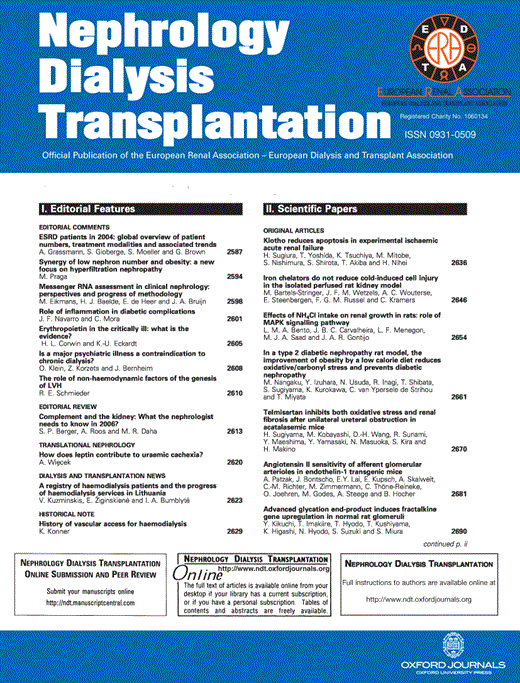-
PDF
- Split View
-
Views
-
Cite
Cite
Anssi H. Manninen, High-protein diets are not hazardous for the healthy kidneys, Nephrology Dialysis Transplantation, Volume 20, Issue 3, March 2005, Pages 657–658, https://doi.org/10.1093/ndt/gfh645
Close - Share Icon Share
Sir,
The recent letter by Luyckx and Mardigan [1] has a somewhat misleading title, as there is certainly no scientific evidence that the high-protein diets are hazardous for healthy kidneys. Furthermore, real world examples support this contention since protein-related kidney problems are essentially non-existent in the body-building community in which extremely high-protein intake has been the norm for over half a century [2]. Also, men in the famous Lewis and Clark expedition across America reportedly ate as much as nine pounds of buffalo meat each day with no ill effects [3]. That is well over 600 g of protein as a daily minimum.
Nevertheless, Anderson and Brenner suggested that high-protein intake played a central role in the decline of renal function with age and that protein restriction might prevent this decline [4]. However, as discussed by Walser [5], this recommendation cannot be supported for a number of reasons: (i) caloric restriction is more effective in rats than is protein restriction in retarding age-associated decline in renal function; (ii) protein restriction tends to lower glomerular filtration rate rather than increase it; and (iii) there is certainly no evidence suggesting that a high intake of protein causes progressive reduction in renal function. Thus, Walser concluded that it is clear that protein restriction does not prevent decline in renal function with age, and, in fact, is the major cause of that decline [5]. According to Walser [5], a better way to prevent the decline would be to increase protein intake.
More recently, the study by Poortmans and Dellalieux [6] investigated body-builders and other well-trained athletes with high- and medium-protein intake, respectively. The athletes underwent a 7-day nutrition record analysis as well as blood sample and urine collection to determine the potential renal consequences of a high protein intake. The data revealed that despite higher plasma concentration of uric acid and calcium, body-builders had renal clearances of creatinine, urea, and albumin that were within the normal range. To conclude, it appears, at least in the short term, that protein intake under 2.8 g/kg does not impair renal function in well-trained athletes.
More recently, Knight et al. [7] determined whether protein intake influences the rate of renal function change in women over an 11-year period. 1624 women enrolled in the Nurses’ Health Study who were 42–68 years of age in 1989 and gave blood samples in 1989 and 2000. Ninety-eight percent of women were white, and 1% was African American. In multivariate linear regression analyses, high protein intake was not significantly associated with change in estimated glomerular filtration rate (GFR) in women with normal renal function (defined as an estimated GFR ≥80 ml/min per 1.73 m2). Thus, the authors concluded that high protein intake does not seem to be associated with renal function decline in women with normal renal function. As pointed out by Lentine and Wrone, the generalizability of these findings is limited by sampling characteristics to white mid-adulthood, but this limitation is overshadowed by strong internal validity based in a large sample size, prospective outcomes ascertainment, and adjustment for multiple covariates [8].
Finally, Pons et al. [9] examined the effect of a protein-rich diet on cyclosporine A (CsA)-induced acute nephrotoxicity in rodents using markers of tubular damage. Interestingly enough, they concluded that a protective effect of high-casein diet against CsA-induced proximal tubular damage was observed in Sprague–Dawley rats. Lacroix et al. [10] studied the effects of a very-high-protein diet in rats over a period of 6 months. Forty eight Wistar rats received either a normal-protein diet (14% protein) or a very-high-protein diet (50% protein). No nephrocalcinosis, no area of collagenous sclerosis, and no hypercellularity were detectable. Also, endothelial and mesangial cells were normal and so were surrounding tubules.
In summary, for individuals with normal renal function, the risks of high-protein weight loss diets are minimal and must be balanced against the real and established risk of continued obesity [11,12].
Conflict of interest statement. None declared.
References
Luyckx VA, Mardigan TA. High-protein diets may be hazardous for the kidneys.
Street C. High-protein intake—is it safe? In: Antonio J, Stout JR, eds.
Colker CM.
Anderson S, Brenner BM. The aging kidney: structure, function, mechanisms, and therapeutic implications.
Walser M. Effects of protein intake on renal function and on the development of renal disease. In:
Poortmans JR, Dellalieux O. Do regular high-protein diets have potential health risks on kidney function in athletes?
Knight EL, Stampfer MJ, Hankinson SE et al. The impact of protein intake on renal function decline in women with normal renal function or mild renal insufficiency.
Lentine K, Wrone EM. New insights into protein intake and progression of renal disease.
Pons M, Plante I, LeBrun M et al. Protein-rich diet attenuates cyclosporin A-induced renal tubular damage in rats.
Lacroix M, Gaudichon C, Martin A et al. A long-term high-protein diet markedly reduces adipose tissue without major side-effects in Wistar male rats.
Manninen AH. High-protein weight loss diets and purported adverse effects: where is the evidence?





Comments